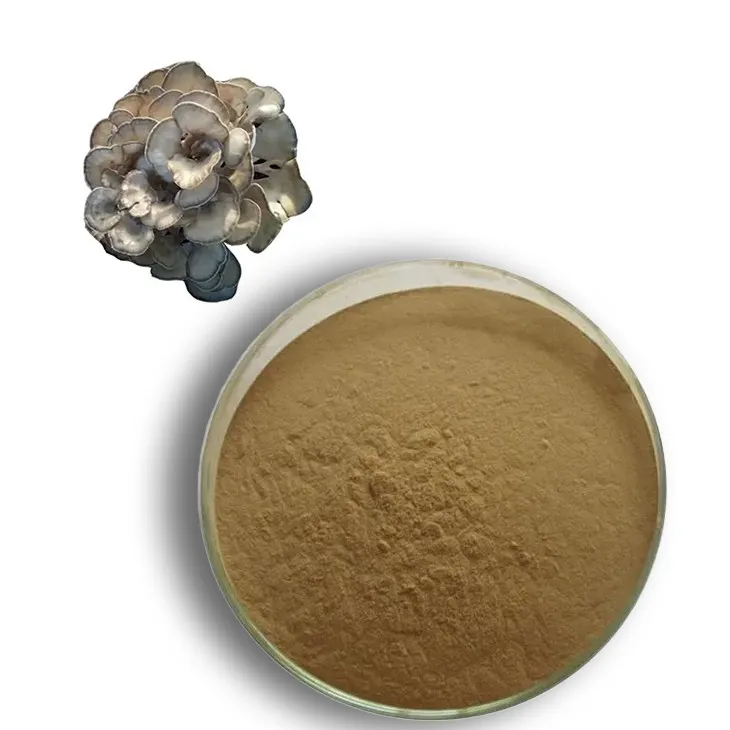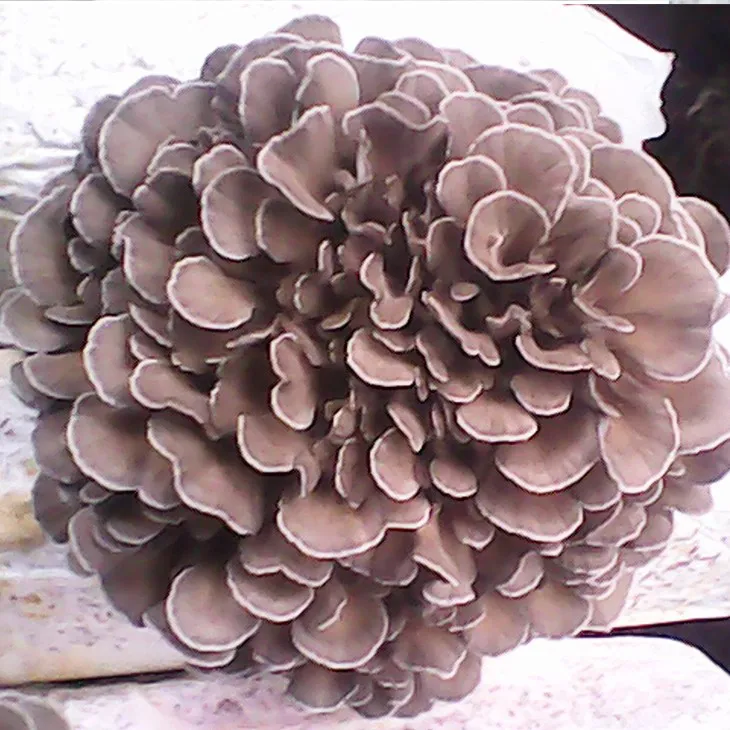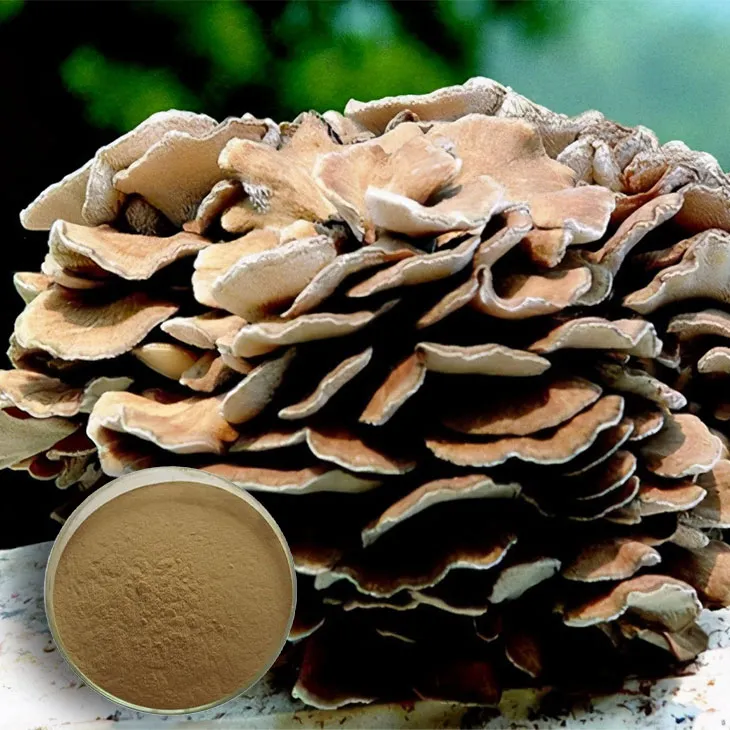- 0086-571-85302990
- sales@greenskybio.com
Wholesale Supplier of Maitake Mushroom Extract.
2024-12-02

1. Introduction to the Maitake Extract Market
The market for Maitake extract has been on a rapid upward trajectory in recent years. Maitake, also known as Grifola frondosa, is a mushroom that has captured the attention of the health and wellness industry as well as the scientific community. Its unique properties and potential health - promoting effects have led to an increased demand for Maitake extract. This demand is not only limited to the domestic markets but has also spread globally, creating a lucrative market for those involved in the supply chain.

2. The Role of Wholesale Suppliers
2.1 Ensuring Stable Supply
Wholesale Maitake extract suppliers play a crucial role in maintaining a stable supply of the product. They have developed extensive networks and established relationships with multiple sources of Maitake mushrooms. These sources can include mushroom farms, foragers, and even international suppliers. By having a diverse range of sources, they are better equipped to deal with any potential disruptions in the supply chain. For example, if one particular region experiences a poor harvest due to adverse weather conditions, the suppliers can rely on other sources to meet the demand. This is of utmost importance for industries that depend on a consistent supply of Maitake extract, such as the pharmaceutical and nutraceutical sectors. In these industries, any interruption in the supply of raw materials can have significant implications for production schedules and ultimately, the availability of products to consumers.
2.2 Maintaining Product Quality
Another vital aspect of the role of wholesale suppliers is ensuring product quality. They adhere to strict quality control standards throughout the extraction and supply process. Firstly, they carefully select the Maitake mushrooms used for extraction. Only high - quality mushrooms are chosen, free from contaminants and diseases. Once the extraction process is complete, comprehensive testing is carried out on the Maitake extract. This testing includes verifying its composition, which ensures that the active compounds are present in the correct proportions. Purity is also a key factor; the extract must be free from impurities such as heavy metals, pesticides, and other harmful substances. Additionally, the potency of the extract is measured to ensure that it meets the required standards. These quality control measures not only help the suppliers to meet regulatory requirements but also build trust with their customers, who expect a high - quality product.
2.3 Global Distribution
Wholesale Maitake extract suppliers are also responsible for the global distribution of the product. They have well - developed logistical capabilities that enable them to ship their products to different regions around the world. Through international partnerships, they can reach a wide customer base. This global distribution is essential for the growth of the Maitake extract market as it allows the product to be used in various applications in different parts of the world. For instance, in some countries, Maitake extract may be more commonly used in health supplements, while in others, it may be incorporated into functional foods. By making the product available globally, wholesale suppliers contribute to the exploration of new markets and the expansion of existing ones.
3. Sourcing and Cultivation of Maitake Mushrooms
3.1 Natural Sourcing
Some wholesale suppliers source Maitake mushrooms from the wild. Foragers play an important role in this process, as they are able to locate and collect these mushrooms in their natural habitats. However, wild - sourced Maitake mushrooms need to be carefully monitored to ensure sustainable harvesting. Over - harvesting can have a negative impact on the natural ecosystem where these mushrooms grow. Therefore, suppliers who rely on wild - sourced mushrooms often work with conservationists and local communities to develop sustainable harvesting practices. This may include setting quotas for the amount of mushrooms that can be collected, as well as ensuring that the collection process does not damage the surrounding environment.
3.2 Cultivation
In addition to natural sourcing, many wholesale suppliers also work with mushroom farms for a more consistent supply. Maitake mushroom cultivation has become an increasingly popular practice, as it allows for better control over the quality and quantity of the mushrooms produced. Mushroom farms can optimize the growing conditions for Maitake mushrooms, such as temperature, humidity, and nutrient availability. This results in mushrooms with consistent characteristics, which in turn leads to a more uniform quality of the extract. Moreover, cultivated Maitake mushrooms can be produced on a larger scale compared to wild - sourced ones, helping to meet the growing market demand.
4. The Extraction Process of Maitake Extract
4.1 Different Extraction Methods
There are several methods used to extract the beneficial compounds from Maitake mushrooms. One common method is solvent extraction. In this process, solvents such as ethanol or water are used to dissolve the active compounds from the mushroom material. Another method is supercritical fluid extraction, which uses supercritical carbon dioxide as the solvent. This method has the advantage of being more environmentally friendly and can often produce a purer extract. Each extraction method has its own pros and cons, and wholesale suppliers need to carefully consider which method to use based on factors such as cost, efficiency, and the desired quality of the extract.
4.2 Quality Assurance during Extraction
During the extraction process, quality assurance is of utmost importance. Suppliers need to ensure that the extraction conditions are carefully controlled to maintain the integrity of the active compounds. This includes monitoring parameters such as temperature, pressure, and extraction time. Any deviation from the optimal conditions can result in a lower - quality extract. Additionally, after the extraction is complete, the extract is often purified further to remove any remaining impurities. This purification step is an important part of the overall quality control process and helps to ensure that the final product meets the high standards expected by the market.5. Regulatory Compliance in the Maitake Extract Supply
5.1 Regulatory Requirements in Different Regions
Wholesale Maitake extract suppliers need to be aware of and comply with the regulatory requirements in different regions. Different countries and regions may have varying regulations regarding the production, sale, and use of Maitake extract. For example, in some areas, there may be strict requirements for labeling, including the need to list all the ingredients and any potential allergens. In other regions, there may be specific regulations regarding the purity and potency of the extract. Suppliers must stay up - to - date with these regulations to ensure that their products can be legally sold in different markets.
5.2 Certifications and Standards
To demonstrate compliance with regulatory requirements and to assure customers of the quality of their products, wholesale suppliers often seek various certifications and adhere to industry - recognized standards. Some common certifications include Good Manufacturing Practice (GMP) certifications, which ensure that the manufacturing processes are carried out in a clean, controlled, and quality - focused manner. Additionally, certifications related to organic production may be relevant for suppliers who source or produce Maitake mushrooms using organic methods. These certifications not only help suppliers to meet legal requirements but also give them a competitive edge in the market.6. Customer Relationships and Market Trends
6.1 Building and Maintaining Customer Relationships
Wholesale Maitake extract suppliers understand the importance of building and maintaining strong customer relationships. They communicate regularly with their customers, providing information about new product offerings, quality control measures, and any changes in the supply chain. By being transparent and responsive, they can build trust with their customers. Additionally, they often offer customized solutions to meet the specific needs of different customers. For example, some customers may require a specific form of the extract, such as a powder or a liquid, and suppliers can work to provide the product in the desired form.
6.2 Market Trends and Adaptation
The Maitake extract market is constantly evolving, and wholesale suppliers need to stay attuned to market trends. One current trend is the increasing demand for natural and plant - based products in the health and wellness industry. As a result, there is a growing interest in Maitake extract as a natural alternative for various health benefits. Suppliers need to adapt to this trend by promoting the natural origins and benefits of Maitake extract. Another trend is the preference for sustainable and ethically sourced products. Suppliers can respond to this by highlighting their sustainable sourcing practices, whether it is through wild - sourced mushrooms with sustainable harvesting or through environmentally friendly cultivation methods.7. Future Outlook for Wholesale Maitake Extract Suppliers
7.1 Opportunities for Growth
The future looks promising for wholesale Maitake extract suppliers. As research continues to uncover more potential health benefits of Maitake extract, the demand for the product is likely to increase further. This presents opportunities for suppliers to expand their market share, both domestically and internationally. Additionally, the growing interest in natural and sustainable products provides an avenue for suppliers to differentiate themselves in the market. By focusing on sustainable sourcing and production methods, they can attract more customers who are conscious about the environmental and ethical aspects of the products they consume.
7.2 Challenges to Overcome
However, there are also challenges that wholesale Maitake extract suppliers will need to overcome. One challenge is the competition in the market. As the market grows, more suppliers may enter the field, leading to increased competition. Suppliers will need to find ways to differentiate themselves, such as through superior product quality, better customer service, or more innovative marketing strategies. Another challenge is the potential for regulatory changes. As the understanding of Maitake extract and its effects on health evolves, regulatory requirements may change. Suppliers will need to be vigilant and adaptable to ensure that they can continue to comply with the regulations and maintain their business operations.FAQ:
1. What are the main responsibilities of wholesale Maitake extract suppliers?
Wholesale Maitake extract suppliers are mainly responsible for ensuring a stable supply by establishing relationships with multiple Maitake mushroom sources. They also adhere to strict product quality standards through comprehensive testing of the extract's composition, purity, and potency. Additionally, they contribute to the global distribution of the product.
2. Why is a stable supply important for industries relying on Maitake extract?
For industries like the pharmaceutical and nutraceutical sectors, a stable supply of Maitake extract is crucial. These industries often have continuous production needs, and any shortages could disrupt their operations. A stable supply from wholesale suppliers helps them maintain their production schedules and meet market demands.
3. How do wholesale Maitake extract suppliers ensure product quality?
Wholesale suppliers ensure product quality by performing comprehensive tests on the Maitake extract. These tests verify the composition, purity, and potency of the extract. By doing so, they can meet regulatory requirements and satisfy customer expectations.
4. What role do wholesale Maitake extract suppliers play in the global market?
Wholesale suppliers play a significant role in the global market. They ship their Maitake extract products to different regions, making the extract available worldwide. Their logistical capabilities and international partnerships promote the widespread use of Maitake extract in various applications, from health supplements to functional foods.
5. Are there any challenges faced by wholesale Maitake extract suppliers?
Yes, there can be challenges. One challenge could be maintaining good relationships with multiple Maitake mushroom sources to ensure a stable supply. Another might be keeping up with changing regulatory requirements regarding product quality. Also, competition in the market can be intense, requiring suppliers to constantly strive to offer better prices and quality.
Related literature
- The Health Benefits of Maitake Mushroom Extract: A Comprehensive Review"
- "Maitake Mushroom Extract in the Pharmaceutical Industry: Current Trends and Future Prospects"
- "Quality Control in the Production of Maitake Extract for Nutraceutical Use"
- ▶ Hesperidin
- ▶ Citrus Bioflavonoids
- ▶ Plant Extract
- ▶ lycopene
- ▶ Diosmin
- ▶ Grape seed extract
- ▶ Sea buckthorn Juice Powder
- ▶ Fruit Juice Powder
- ▶ Hops Extract
- ▶ Artichoke Extract
- ▶ Mushroom extract
- ▶ Astaxanthin
- ▶ Green Tea Extract
- ▶ Curcumin
- ▶ Horse Chestnut Extract
- ▶ Other Product
- ▶ Boswellia Serrata Extract
- ▶ Resveratrol
- ▶ Marigold Extract
- ▶ Grape Leaf Extract
- ▶ New Product
- ▶ Aminolevulinic acid
- ▶ Cranberry Extract
- ▶ Red Yeast Rice
- ▶ Red Wine Extract
-
Chasteberry Extract
2024-12-02
-
Milk Thistle Extract
2024-12-02
-
Curcumin
2024-12-02
-
Giant Knotweed Extract
2024-12-02
-
Coix Seed Extract
2024-12-02
-
Nutmeg Extract
2024-12-02
-
Uridine-5'-monophosphate Disodium salt
2024-12-02
-
Red Date Extract
2024-12-02
-
Cassia Seed Extract
2024-12-02
-
Aminolevulinic acid
2024-12-02





















